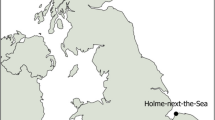Abstract
In this new series, I will muse about books I love and reflect on the authors, the content, the style, the context in which the books were written, and what they mean for us today. My goal will be less to convey the book’s subject matter and more to inspire my readers to read the book under discussion and books more generally and reflect on the process of reading and writing. Today most scientists live and run in the fast lane, writing large grant proposals and short papers with no time to read or write anything more than a few pages; we live in a world where short-term performance is rewarded and not sustained scholarship. Indeed, it has become fashionable to look down upon reading and writing books as old fashioned. My goal is to reverse this trend and put the mojo back into reading and writing books in science.
Similar content being viewed by others
Suggested Reading
G E Hutchinson, Homage to Santa Rosalia or why are there so many kinds of animals?, The American Naturalist, Vol.93, pp.145–159, 1959.
N G Slack, G. Evelyn Hutchinson and the Invention of Modern Ecology, With a Foreword by E. O. Wilson, Yale University Press, New Haven, London, 2010.
G E Hutchinson, The Ecological Theater and the Evolutionary Play, Yale University Press, New Haven, 1973.
Cambridge Daily News, “Mr Gandhi in Cambridge”—1931., Lost Cambridge, 02 Nov 1931. https://lostcambridge.wordpress.com/2018/07/24/mr-gandhi-in-cambridge-1931/.
G E Hutchinson, The Clear Mirror: A Pattern of Life in Goa and in Indian Tibet, Cambridge University Press; Reissue edition, 1936.
G E Hutchinson, Marginalia, The American Naturalist, Vol.31, p.270, 1943.
G E Hutchinson, Marginalia: What is science for?, American Scientist, Vol.71, No.6 pp.639–644, 1983.
E O Wilson, Biophilia: The Human Bond With Other Species, Harvard Univ. Press, Cambridge, Mass., 1984.
G E Hutchinson, The paradox of the plankton, The American Naturalist, Vol.95, pp.137–146, 1961.
G E Hutchinson, Concluding Remarks, Cold Spring Harb Symp Quant Biol., Vol.22, No. Population Studies: Animal Ecology and Demography, pp.415–427, 1957.
D Simberloff and W Boecklen, Santa Rosalia reconsidered: Size ratios and competition, Evolution, Vol.35, pp.1206–1223, 1981.
R Lewin, Santa Rosalia was a goat, Science, Vol.221, pp.636–639, 1983.
C Darwin, On the Origin of Species by Means of Natural Selection, or the Preservation of Favoured Races in the Struggle for Life, John Murray, London, 1859.
W L BrownJr and E O Wilson, Character displacement, Systematic Biology, Vol.5, No.2 pp.49–64, Jun. 1956.
P R Grant, Convergent and divergent character displacement, Biological Journal of the Linnean Society, Vol.4, No.1 pp.39–68, 1972.
J Weiner, The Beak of the Finch: A Story of Evolution in Our Time, Vintage Books, New York, 1995.
P R Grant and B R Grant, 40 Years of Evolution: Darwin’s Finches on Daphne Major Island, Princeton University Press, Princeton, New Jersey, 2014.
E R Pianka, Evolutionary Ecology, 7th ed. Benjamin Cummings, San Francisco, California, 2011.
Author information
Authors and Affiliations
Corresponding author
Additional information
Raghavendra Gadagkar is DST Year of Science Chair Professor at the Centre for Ecological Sciences, Indian Institute of Science, Bangalore, Honorary Professor at JNCASR, and Non-Resident Permanent Fellow of the Wissenschaftskolleg (Institute for Advanced Study), Berlin. During the past 40 years he has established an active school of research in the area of animal behaviour, ecology and evolution. The origin and evolution of cooperation in animals, especially in social insects, such as ants, bees and wasps, is a major goal of his research. http://ces.iisc.ac.in/hpg/ragh. https://www.researchgate.net/profile/Raghavendra_Gadagkar
Rights and permissions
About this article
Cite this article
Gadagkar, R. Bibliophilia: The Father of Modern Ecology. Reson 27, 839–853 (2022). https://doi.org/10.1007/s12045-022-1377-3
Published:
Issue Date:
DOI: https://doi.org/10.1007/s12045-022-1377-3




